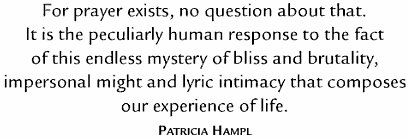 |
Every religious greeting is indeed a short prayer, wishing others to be at peace. It is all about invoking goodness to connect with others. It incorporates both the elements of altruism and selfishness. It is to wish others peace and creating that positive energy in others. The Sikhs wish others Sat Sri Akal ( Truth is God or God is Truth) and also have a prayer known as Ardas, a supplication to the Creator to express their gratitude and pray for the goodwill of others with malice to none.
It is difficult to quantify who prays and who does not. Someone once remarked to me that you must be religious and the next question just baffled me. How many times do you pray and to whom do you pray? My response was, to the Creator, the Infinite, and I am indebted to Him in times of happiness and sorrow. He is the Knower of one's inner self and I believe I live under His command. It gradually dawned upon me that the person, who was curious and inquisitive, turned out to be an atheist. She said: I do not believe in God and many others have also said that they are atheists." Atheists are those who believe that there is no God or that assertion of His existence is meaningless. The agnostic is a person who holds that only material phenomena can be known and knowledge of a Supreme Being, that is God or the Creator, is impossible.
Mike Ghouse has examined six different types of prayers in his article, "Prayer and subjective well-being." His research was an attempt to find the utility of the prayers in the form of well-being of an individual. Broadly speaking, he has classified the prayers into two categories: prayers focused on one's needs and prayers of gratitude.
The category of prayers focused on one's needs are: confession, supplication and obligatory prayers, whereas the adoration, thanksgiving and reception are focused on God. The first category is a need-based transaction whilst the second one is sort of altruism. "I don't need anything, but I am grateful for what I have" is more like a prayer of gratitude. He identifies the value of well-being in terms of self-esteem, optimism, meaning in life and satisfaction with life. Indeed, life is about balance, an inexplicable spiritual balance, it is a dynamic value and every moment that balance is present, well-being results. Well-being can be further defined as feeling secure, feeling beyond conflicts and free from anxiety and fear. It is good to have that balance and equipoise and I believe this is achieved via sincere prayers with love and devotion.
Thus, prayers that have positive effects in sustaining the well-being of an individual appear to be less ego-focused and more focused on God, such as adoration, thanksgiving and reception. On the other hand prayers that were considered negative, adding uncertainty and doubts were related with prayers like confession, supplication and obligatory prayers. Indeed, prayers do add to the well-being of individuals who are oriented to the religious idea of prayers. For the spiritualists, it is restoration of balance in one's life, balance in the sense of being normal, being "home" free from anxiety.
According to William James (1902/1994), prayer is "the very soul and essence of religion". (p. 505)
Prayer is an attempt to create a meaningful relationship with God. Thus, it plays an important role in the religious meaning system (Park, 2005; Silberman, 2005). Different forms of prayer add different things to this meaning system. However, little attention has been paid to the differing psychological experiences that people attempt to create for themselves during prayer. Rather, the majority of current research views prayer as an undifferentiated concept. We expect that not all types of prayer will have positive effects on well-being. In the current study, Mike Ghouse used a more nuanced measure of prayer (Laird, Snyder, Rapoff, & Green, 2004), which measures five prayer types: adoration, confession, thanksgiving, supplication, and reception.
 |
Through Ardas, the Sikh Prayer, the individual or Sangat can seek gifts such as humility, wisdom, purity, and protection through Divine Power. A request to help in controlling the evil aspects of the mind such as lust, anger, greed, attachment and ego. From time to time, salutations to "Wondrous Lord" are made and Sikhs are reminded that Khalsa (pure) belongs to the Lord to whom the victory belongs. Sikhs are reminded that True Timeless Lord will fulfil all those who say PRAYERS in this manner by connecting their MIND/SOUL to the Divine.
By remembering historical experiences of the community in Ardas, Sikhs stay in touch with their "collective unconscious". Through ARDAS they develop an aptitude for capitalising on their past struggles, self control, ability to envisage ideals, social reliability, predictability, capacity to act independently while acknowledging SATGURU's Grace and Hukam. It has been empirically established that ARDAS as a prayer produces FAITH which leads to healing. They feel that prayer could be colloquial, petitionary, ritualistic and meditative and the Sikh Ardas has components of all of the above methods of prayer.During the Sikh Ardas, the whole Sangat experiences Stillness, Connectivity, and Wholeness and goes into meditative aspects, contemplative mode of consciousness. In the petitionary form of Ardas, the Sikhs tell their SatGuru their concerns and gratitudes and petition Him for specific wishes. They also actively "listen" and ask SatGuru for directions. In meditative Ardas, the Sangat collectively "listens" to SatGuru through Shabads and Naam Simran which makes them experience His Divine presence in the most intimate way. They become a partner in Divine Hukam and wait for His directions and blessings. After Naam Simran, the Sikhs wait for his "Vak" (from the Holy Granth), His words of Wisdom.
The prayer (Ardas) becomes a two-way street of Naam Simran and waiting for His Hukam. It leads them to unquestionable faith in Him. It leads to miracles, cure and relief of physical and psychological ailments. There are anecdotal evidence to support this as devotees themselves have vouched their recovery from prayers (Vasu Bhardwaj and many others) Dr. H. Benson of Harvard University, Boston entitled Timeless Healing, the Power & Biology of Belief (1996. Page 305, Scribner, New York) vehemently stated: "Our bodies are nourished and healed by prayer and other exercises of belief. To me this capacity does not seem to be a fluke, and the design does not seem haphazard. There is a 'deliberate supernatural design', a potency of faith which gets proven over and over again in my research".
 |
Prayer is a form of religious practice that seeks to activate a volitional connection to some greater power in the universe through deliberate practice. Prayer may be either individual or communal and take place in public or in private. It may involve the use of words or song. When language is used, prayer may take the form of a hymn, incantation, formal creedal statement, or a spontaneous utterance in the praying person. There are different forms of prayer such as petitionary prayer, prayers of supplication, thanksgiving, and worship/praise. Prayer may be directed towards a deity, spirit, deceased person, or lofty idea, for the purpose of worshiping, requesting guidance, requesting assistance, confessing sins or to express one's thoughts and emotions. Thus, people pray for many reasons such as personal benefit or for the sake of others.
Praying has many different forms. Prayer may be done privately and individually, or it may be done corporately in the presence of fellow-believers. Prayer can be incorporated into a daily "thought life," in which one is in constant communication with a God. Some people pray throughout all that is happening during the day and seek guidance as the day progresses. There can be many different answers to prayer, just as there are many ways to interpret an answer to a question. A variety of body postures may be assumed, often with specific meaning (mainly respect or adoration) associated with them: standing; sitting; kneeling; prostrate on the floor; eyes opened; eyes closed; hands folded or clasped; hands upraised; holding hands with others; a laying on of hands and others. Prayers may be recited from memory, read from a book of prayers, or composed spontaneously as they are prayed. They may be said, chanted, or sung. They may be with musical accompaniment or not.
 |
Attention in prayer
 |
Finally, attention is of the very essence of prayer. As an expression of sentiment, emanating from our intellectual faculties, prayer requires their application, i.e. attention. As soon as this attention ceases, prayer ceases. To begin praying and allow the mind to be wholly diverted or distracted to some other occupation or thought necessarily terminates the prayer, which is resumed only when the mind is withdrawn from the object of distraction. To admit distraction is wrong when one is obliged to apply oneself to prayer; when there is no such obligation, one is at liberty to pass from the subject of prayer, provided it be done without irreverence, to any other proper subject. This is all very simple when applied to mental prayer; but does vocal prayer require the same attention as mental, in other words, when praying vocally must one attend to the meaning of words, and if one should cease to do so, would one, by that very fact cease to pray? Vocal prayer differs from mental precisely in this that mental prayer is not possible without attention to the thoughts that are conceived and expressed whether internally or externally. Neither is it possible to pray without attending to thought and words when we attempt to express our sentiment in our own words; whereas all that is needed for vocal prayer proper is the repetition of certain words, usually a set form with the intention of using them in prayer. So long as the intention lasts, i.e. so long as nothing is done to terminate it or wholly inconsistent with it, so long as one continues to repeat the form of prayer, with proper reverence in disposition and outward manner, with only this general purpose of praying according to the prescribed form, so long as one continues to pray and no thought or external act can be considered a distraction unless it terminates our intention, or by levity or irreverence be wholly inconsistent with the prayer. Thus one may pray in the crowded streets where it is impossible to avoid sights and sounds and consequent imaginations and thoughts.
The Dalai Lama says that religious leaders should stop relying on prayer and meditation to bring about world peace. They should do something instead."Change only takes place through action, not through meditation and prayer." --The Dalai Lama
When the emergency technician is about to apply CPR, nobody says: "Wait! Let's pray first."
Prayer is attempted communication with supernatural beings (SBs) or metaphysical energies. The word derives from a 14th century French word (preiere) meaning "to obtain by entreaty". The most common use of the word "prayer" is asking an SB for some favor or entreating an invisible force or energy to fulfill one's desire. This type of prayer I'm calling intercessory prayer (IP) because it is done to ask an SB or energy to intercede on behalf of oneself or someone else. Technically, I'm told, if you ask for intercession on behalf of oneself, your prayer is called petitionary, and if you ask on behalf of others it's called intercessory because the one praying is interceding between the SB and the one being prayed for.
The Prayer preceeding all prayers:
"May it be the real I who speaks.
May it be the real Thou to whom i speak."
Ford comments: This is perhaps the hardest
truth of any to grasp.
Do we wake up every morning amazed that we are loved by God?
Do we allow our day to be shaped by God's desire to relate to us?
"The interesting thing to me about prayer is this: It presumes that we do not have the thing for which we are praying. In other words, it is based on the presumption of lack and want. I believe this to be a false presumption. Everything we need is always at hand. Thinking that this is not, in fact, the case prevents things from manifesting in our lives. Knowing (in our conscious, subconscious and unconscious minds) that there is never any lack whatsoever, and that everything that is needed at any moment is always at hand at the particular moment we need it, results in a different type of prayer entirely. Rather than supplication, prayer becomes a statement of fact, an image of the manifestation that is already in process; a positive projection of completion."
- Guruka Singh
References:
Healing and Uplifting Power of Ardas adapted from original by Dr. S.S. Sodhi
Whittington, Brandon L. and Scher, Steven J. 'Prayer and Subjective Well-Being: An Examination of Six Different Types of Prayer', International Journal for the Psychology of Religion, 20:1, 59 - 68
Prayer: Sikhwikhi
http://wisdomofreligion.blogspot.com/2010/05/national-prayer-day-thursday-may-7-2010.html
